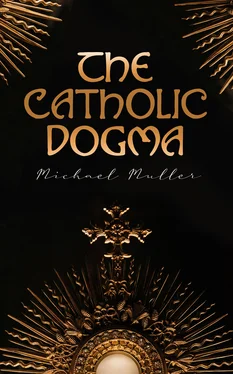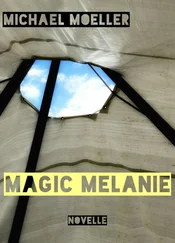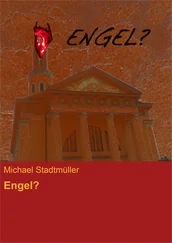Michael Müller - The Catholic Dogma
Здесь есть возможность читать онлайн «Michael Müller - The Catholic Dogma» — ознакомительный отрывок электронной книги совершенно бесплатно, а после прочтения отрывка купить полную версию. В некоторых случаях можно слушать аудио, скачать через торрент в формате fb2 и присутствует краткое содержание. Жанр: unrecognised, на английском языке. Описание произведения, (предисловие) а так же отзывы посетителей доступны на портале библиотеки ЛибКат.
- Название:The Catholic Dogma
- Автор:
- Жанр:
- Год:неизвестен
- ISBN:нет данных
- Рейтинг книги:4 / 5. Голосов: 1
-
Избранное:Добавить в избранное
- Отзывы:
-
Ваша оценка:
- 80
- 1
- 2
- 3
- 4
- 5
The Catholic Dogma: краткое содержание, описание и аннотация
Предлагаем к чтению аннотацию, описание, краткое содержание или предисловие (зависит от того, что написал сам автор книги «The Catholic Dogma»). Если вы не нашли необходимую информацию о книге — напишите в комментариях, мы постараемся отыскать её.
The Catholic Dogma — читать онлайн ознакомительный отрывок
Ниже представлен текст книги, разбитый по страницам. Система сохранения места последней прочитанной страницы, позволяет с удобством читать онлайн бесплатно книгу «The Catholic Dogma», без необходимости каждый раз заново искать на чём Вы остановились. Поставьте закладку, и сможете в любой момент перейти на страницу, на которой закончили чтение.
Интервал:
Закладка:
"The age" says Dr. O. A. Brownson, "boasts of its liberality; but its boasted liberality is the result of its indifferentism to dogmatic theology, and its lack of firm belief in any positive or affirmative truth at all. The sects have ceased to cut each other's throats, for the differences between them are not worth quarrelling about, since they are all animated by one and the same spirit, and are moving in one and the same direction. Yet, wherever the age is in earnest, it is as intolerant as any preceding age. There may be individuals who honestly detest intolerance in every way or shape, but these are chiefly to be found among Catholics who take seriously the popular doctrine of religious liberty, and go out of their way to disclaim all solidarity with the past history of their Church, and to protest against the spirit, if not the very letter, of the Syllabus. The Church teaches the truth, and all truth is intolerant, and refuses to tolerate even the semblance of error. The popularity or the unpopularity of a principle or doctrine has nothing to do with its truth or with one’s obligation to stand by it. Where Catholics are in a minority, as with us, worldly prudence may seem to counsel the advocacy of what is called, but falsely so called, the freedom of conscience, that is, the right of every man to form or to choose for himself his own religion and abide by it; but a higher prudence, divine prudence, counsels adherence to Catholic principle, to that which is true always and everywhere. Neither the principles nor the doctrines of the Church change or undergo any modification with the changes or variations of time or place. No man has the right before God, however he may before the state, to hold any religion but the one only true Catholic religion, and no one can adhere to any other but at his own peril.
"Yet, with all their boasted liberality, Protestants assert only the liberty to deny the truth, and if their intolerance to Catholicity has changed its form, it has not diminished in its intensity. Their hatred of the Church has in no degree abated. Protestant nations do not now persecute Catholics, as they did in the beginning, from fear of the intervention of foreign Catholic governments, for, strictly speaking, there are no longer any Catholic governments on earth; yet their dread of the Church and hostility to everything Catholic are as great as ever, and precisely because the term Catholic is directly opposed to their denial of objective truth, and their resolution of religion into a subjective sentiment or emotion, varying with place and time, and from individual to individual. They feel this; they feel that Catholicity is the assertion of Catholic truth, and therefore that the Church differs from them, not simply in degree, as more or less, but in kind, and directly contradicts their whole order of thought. Hence the intolerance of Protestants to Catholicity is not inspired by love of truth or by zeal for the word of God, but by their want of faith, and wish to feel themselves free from all obligation to believe and hold fast the truth, to follow either reason or revelation, contented with their own opinions, whatever they may be, and satisfied to live and die in their religious indifferentism, or simple religious subjectivism. This they cannot do so long as confronted with the Catholic Church. They must destroy her or not be able to enjoy with a quiet conscience their own beliefs or no beliefs.
"The hostility to the Church does not arise from her special doctrines or dogmas, or from any intellectual conviction that they are false or unreasonable, but from the fact that she teaches that truth is objective, independent of the believer, and is obligatory, and no one has or can have the right before God to resist it. Protestants hate the Church for two reasons: 1. because she claims to teach infallibly by the divine assistance, and 2. because she maintains that truth is Catholic and binds both reason and conscience. The claim of the Church to teach by divine authority through the Pope and Councils was the principal object of hostility in the beginning. This was an absolute necessity of the position assumed by the reformers. But, we have seen, as time went on, it became necessary, in order to sustain their position against the pressure of the Catholic argument, to deny not only the authority of the Church; but also the authority of truth itself, and then to hold themselves under no obligation to regard it, and free to resist it whenever they chose. The presence and influence of the Church are opposed to this interior freedom from truth, which unbelievers call freedom of mind, and Protestants religious liberty, and both make war on her, and war to the knife, because she does not and cannot favor it: They, unbelievers, and Protestants, form an alliance against her, and seek, by all the arts and devices in their power, her total destruction from the face of the earth; for both instinctively feel that either she or they must perish.
"It is worthy of remark that in the war which Protestants and infidels have hitherto waged against the Church neither has nor pretends to have any truth or principle to oppose to her. They do not fight for the truth, nor for any affirmative or Catholic principle that she denies or neglects; but for what they call the rights of the mind, which, translated into plain English, means the emancipation of the human mind from the authority of truth, and therefore from God who is truth, or, in simpler terms still, the liberty to treat truth and falsehood as of equal value, as equally indifferent, or to deny all real distinction between them, and therefore between right and wrong. Neither reason nor revelation can tolerate this sort of liberty - intellectual and moral license rather; and the very existence and presence of the Church condemns it. Hence the irreconcilable antagonism between the Church and the sects. Yet is there a notable difference between the temper and motives of the two parties. The Church is always calm and collected, for she knows that she has the truth; she indulges in no passion, resorts to no violence, to no cruelty or harshness against her enemies, for she knows that they are only harming themselves, not her; and hence she is moved in her resistance to their blind rage only by that divine charity which seeks to save souls, not to destroy them. She is moved by love for her enemies, and seeks at all times, by all the means in her power, to do them good, - good for time and for eternity. Her temper towards them is that of infinite tenderness and compassion. But the temper of her enemies towards her is that of hatred, and hatred without cause; they are not moved by charity, by love of souls; for, if they believe in salvation at all, they believe that souls can be saved in the Church at least as well as out of it, and hence, the dupes of their own hateful passions, there is no extreme of violence or cruelty to which, where they have the power, they will not go, if they judge it necessary or useful to their cause. We see the proofs of it in the anti-Catholic legislation and measures of Prussia, of Switzerland, of protestantized Italy, revolutionary Spain, and the miserable republics south of us on this continent, where the influence of our own republic has been most hostile to religion and the peace and order of society.
"All these things prove, first, that the Protestant party do not, as they pretend, oppose the Church for purely political reasons, for she has no political power or connection; and, second, that they really, here and everywhere, oppose her because she is Catholic in her teaching, asserts truth as binding on the intellect and the conscience, in direct contradiction to their doctrine of the indifference of truth and falsehood, or that every man has the natural right to be of any religion, if not Catholic, or of no religion, as he pleases.
"There are, no doubt, Protestants in large numbers who hold the principal Christian mysteries as taught by the Church and handed down by tradition; but they, as we have said, hold them, not as Catholic truth, but as opinions, which do not bind the intellect or conscience, and which they are free to hold or reject as suits their pleasure, their convenience, or their caprice. In the popular language of the day, they are called simply religious opinions, not dogmas, and rarely articles of faith. Some may hold them to be essential doctrines of Christianity, but Christianity itself is held to be an opinion, or an interior sentiment, not a law which no one has the right to dispute, and which everyone is bound to obey. It is only one among many religions, none of which are wholly false or wholly true.
Читать дальшеИнтервал:
Закладка:
Похожие книги на «The Catholic Dogma»
Представляем Вашему вниманию похожие книги на «The Catholic Dogma» списком для выбора. Мы отобрали схожую по названию и смыслу литературу в надежде предоставить читателям больше вариантов отыскать новые, интересные, ещё непрочитанные произведения.
Обсуждение, отзывы о книге «The Catholic Dogma» и просто собственные мнения читателей. Оставьте ваши комментарии, напишите, что Вы думаете о произведении, его смысле или главных героях. Укажите что конкретно понравилось, а что нет, и почему Вы так считаете.












